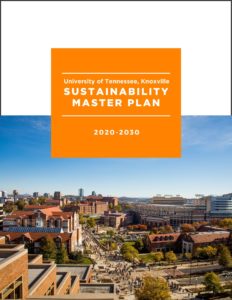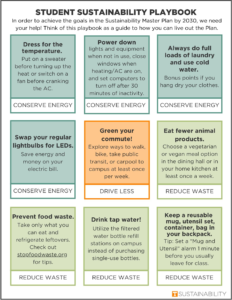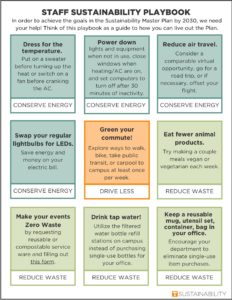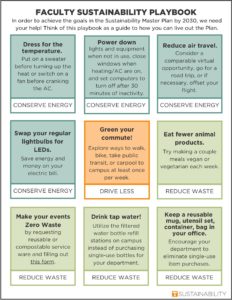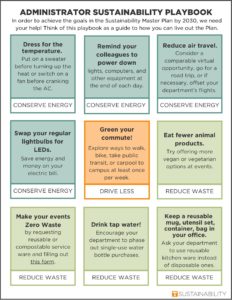Sustainability Master Plan
A vision for the next 10 years of sustainability at UT.
The Sustainability Master Plan addresses the greenhouse gas reductions needed to reach our carbon neutrality date of 2061 set forth in the 2011 Climate Action Plan, as well as more holistic aspects of sustainability inspired by the UN’s Sustainable Development Goals.
View the Sustainability Master Plan here
Sustainability Playbooks
Wondering how you can contribute to making the goals in the Master Plan a reality?
Click on the Sustainability Playbook that best corresponds with your role on campus:
Policies and Commitments
UT realizes the importance of large-scale systematic changes in its goals to become greener. Here are some of the policies and commitments aimed at doing so.
Zero Waste Commitment
In January of 2020, Chancellor Donde Plowman committed the university to achieving a 50% waste diversion rate by 2030, as part of a larger goal to become a Zero Waste institution. The commitment and plan to achieve this goal was created by the Office of Sustainability and the Committee on the Campus Environment, along with support from the Post-Landfill Action Network‘s Atlas Advising program.
More about the Zero Waste Commitment
Campus Environmental Policy
This groundbreaking policy states that UT will aspire to serve as a model of sustainability, stewardship, and inter-generational responsibility. The Committee on the Campus Environment (CCE) drafted the policy in 2004 and worked with the Office of the Chancellor to enact it that year. In 2011, the CCE and the Office of Sustainability helped to revise the policy so that it emphasizes the university’s commitment to environmental compliance and pollution prevention.
More about the Campus Environmental Policy
Energy Conservation Policy
Enacted in 2008, this policy identifies energy conservation as a significant issue for UT and outlines steps to manage and reduce campus energy consumption. The policy establishes that, during normal occupied hours, target indoor air temperatures in campus buildings shall be 68 degrees Fahrenheit for heating and 76 degrees Fahrenheit for cooling. In addition, the policy sets guidelines for energy-efficient purchasing, computing, lighting, and water use by UT faculty, staff, students, and visitors.
More about the Energy Conservation Policy
Sustainable Building Policy
Established in 2007, this policy establishes the United States Green Building Council’s (USGBC) Leadership in Energy and Environmental Design (LEED) rating system as the standard for new construction and major renovation projects at UT that cost more than $5 million. Under the policy, all such projects must be designed to meet the minimum requirements of LEED for New Construction and Major Renovations (LEED-NC). Small-scale renovations utilize the LEED for Commercial Interiors (LEED-CI) rating system as applicable.
More about the Sustainable Building Policy
Presidents’ Climate Commitment
In 2007, then-Chancellor Loren Crabtree signed the American College and University Presidents’ Climate Commitment (ACUPCC), joining UT with other colleges and universities in a pledge to eliminate greenhouse gas emissions from campus operations and to promote sustainability and climate change research and education.
- As an ACUPCC signatory, UT must fulfill five requirements:
- Complete a GHG emissions inventory.
- Within two years, set a target date and interim milestones for becoming climate neutral.
- Take immediate steps to reduce greenhouse gas emissions by choosing from a list of short-term actions.
- Integrate sustainability into the curriculum and make it part of the educational experience.
- Make the action plan, inventory, and progress reports publicly available.
In 2010, Chancelor Cheek upheld the ACUPCC commitment by signing and making available UT’s Climate Action Plan. This plan outlines the steps UT will take to achieve climate neutrality.
Talloires Declaration
Signed by then-Chancellor Loren Crabtree in 2007, the Talloires Declaration is a broad statement by higher education leaders around the world in support of ten key environmental principles that range from a commitment to sustainable campus practices to placing a priority on environmental education as part of the curriculum.
